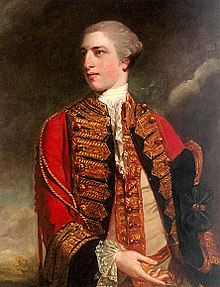The Lord Southampton | |
|---|---|
 Portrait by Sir Joshua Reynolds c. 1760 | |
| Member of Parliament for Orford | |
| In office 1759–1761 | |
| Member of Parliament for Bury St Edmunds | |
| In office 1761–1774 | |
| Member of Parliament for Thetford | |
| In office 1774–1780 | |
| Personal details | |
| Born | 25 June 1737 |
| Died | 21 March 1797 Stanhope Street, London |
| Resting place | St James's burial ground, Hampstead Road |
| Nationality | British |
| Political party | Whig |
| Spouse | Anne Warren |
| Children | Sixteen including:
George FitzRoy, 2nd Baron Southampton Charles FitzRoy |
| Parents |
|
| Relatives | Augustus FitzRoy, 3rd Duke of Grafton (brother) |
| Residence(s) | FitzRoy Farm, Highgate |
| Occupation | Soldier and politician |
| Military service | |
| Allegiance | Kingdom of Great Britain |
| Branch/service | British Army |
| Years of service | 1752–1797 |
| Rank | General |
| Unit | 1st Foot Guards |
| Battles/wars | |
General Charles FitzRoy, 1st Baron Southampton (25 June 1737 – 21 March 1797) was a British Army officer who served in the Seven Years' War and a politician who sat in the House of Commons from 1759 to 1780. The second son of Lord Augustus FitzRoy, FitzRoy joined the 1st Foot Guards as an ensign in 1752 and was promoted to lieutenant-colonel in 1758. In the following year he fought at the Battle of Minden as an aide de camp, where he was a part of the controversy surrounding Lord George Sackville's slow reaction to orders sent to him. FitzRoy was also present at the Battle of Vellinghausen in 1761. Having been quickly promoted through the ranks with the support of his powerful family, he was promoted to major-general in 1772 and became a general in 1793.
With the patronage of his elder brother Augustus FitzRoy, 3rd Duke of Grafton, FitzRoy also had a long political career. He was a Groom of the Bedchamber from 1760 to 1762 and Whig Member of Parliament for Orford from 1759 to 1761, for Bury St Edmunds from 1761 to 1774 and for Thetford from 1774 to 1780. He was created Baron Southampton on 17 October 1780 for his support of Lord North's ministry and became Groom of the Stole to the Prince of Wales later in the year, a position he would hold for the rest of his life. He was succeeded by his eldest son, George, upon his death in 1797.